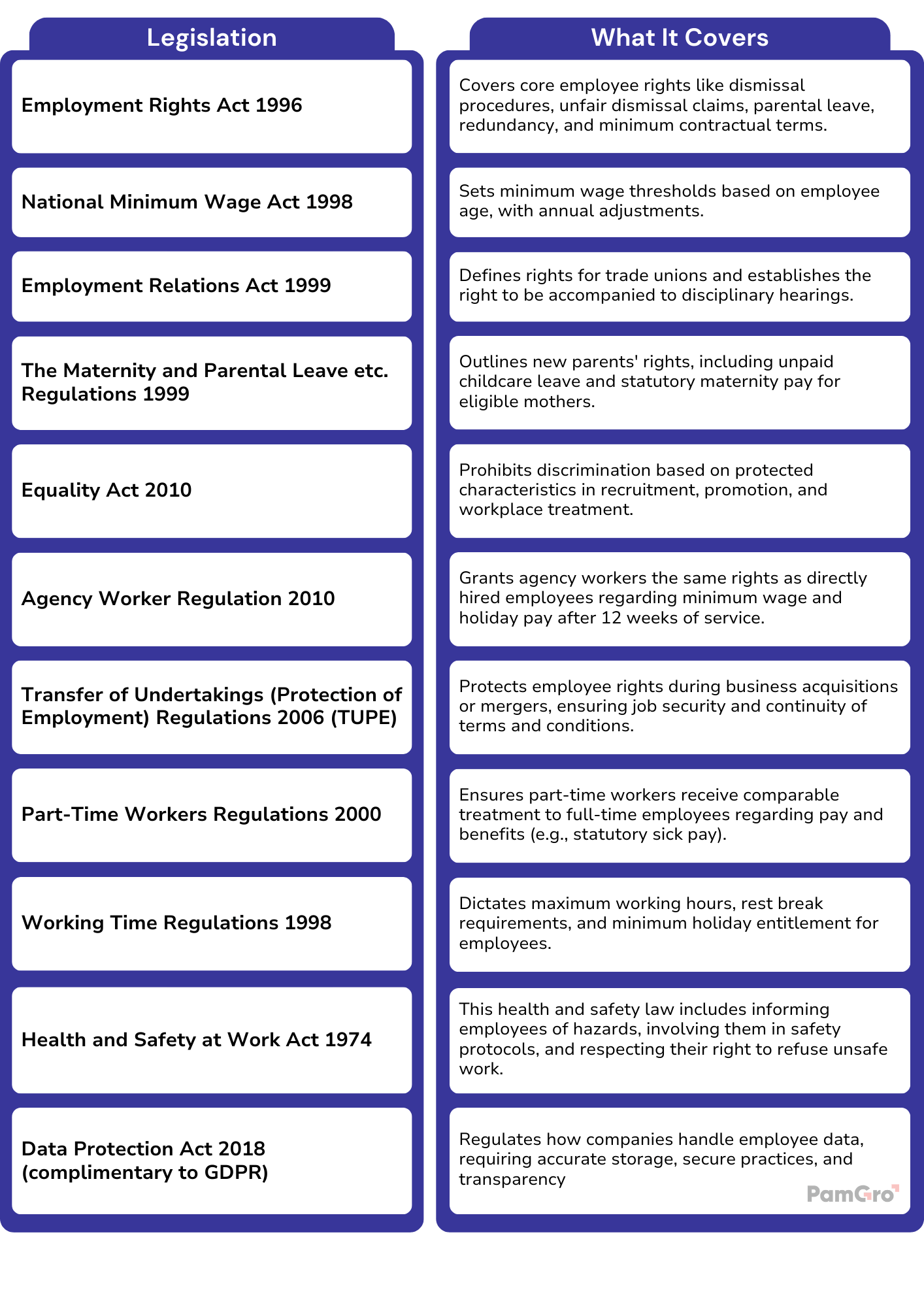Running a business in the UK is exciting! But navigating the complexities of employment law can feel like wandering through a legal labyrinth. Fear not, fellow employer! PamGro is here to be your friendly champion, guiding you through the maze of employment tribunal and ensuring your employee-employer relationships are happy and compliant.
What is Employment Law?
Employment law is the legislation that outlines the rights and responsibilities of both employers and employees in the UK. It covers a wide range of issues, including but not limited to, age discrimination, bullying and harassment, equality, contracts, pay, and working hours.
As an employer, it is crucial to abide by these laws to ensure your employees are treated fairly and that your company remains compliant. By understanding your obligations, you can create a positive and safe work environment for your staff and avoid potential legal issues.
Why is Employment Law Important?
Employment law isn’t just a bunch of rules to memorize. It’s about fostering a fair and safe work environment for your team. These laws guarantee equal pay and everyone is treated with respect, leading to a positive work culture that benefits both you and your employees.
The Keystones of UK Employment Law
- Equality for All: Discrimination is a big no-no! The Equality Act 2010 protects employees from being judged based on age, race, religion, or other personal characteristics. Everyone deserves a fair shot!
- Fair Pay and Working Conditions: Nobody deserves to be underpaid or overworked. The National Minimum Wage Act sets the minimum wage you must pay, while regulations ensure employees get paid holidays and breaks to maintain a healthy work-life balance.
- Contracts and Clear Expectations: A well-defined employment contract outlines what’s expected of both you and your employee. It also details their rights, like sick leave and parental leave, ensuring everyone is on the same page.
- Safety First: The Health and Safety at Work Act emphasizes providing a safe work environment. This means protecting employees from hazards and giving them the right to know about any potential risks.
What Does Employment Law Cover?
Employment law covers a vast array of topics, all of which are designed to protect employees and provide a framework for employers to follow. Here are some key areas that fall under this legislation:
- Age Discrimination: It is illegal to discriminate against employees or potential employees based on their age. This includes hiring, promotion, and dismissal decisions.
- Bullying and Harassment: Employers have a responsibility to provide a safe working environment, free from bullying, harassment, or any form of discrimination. This includes protecting employees from sexual harassment, racial discrimination, and disability discrimination, among others.
- Equality Act 2010: This act ensures that employers cannot discriminate during the recruitment process or in the workplace based on protected characteristics. These include disability, race, religion or belief, sex, sexual orientation, pregnancy, and maternity.
- Employment Contracts: All employees are entitled to a written statement of terms, outlining their rights and responsibilities, pay, working hours, and other key information.
- National Minimum Wage: Employers must ensure they are paying their staff at least the minimum wage as set out by law. This applies to all workers, including part-time and full-time employees.
- Holiday Pay: Employees are entitled to paid holiday leave, and this should be outlined in their contracts.
- Parental Leave: Both maternity and paternity leave are covered by employment law, ensuring new parents have the right to time off work.
- Redundancy and Dismissal: Employers must follow fair processes when making employees redundant or dismissing them. Employees also have the right to claim unfair dismissal after a certain period of service.
- Working Hours: Legislation outlines the maximum number of working hours and rest breaks employees are entitled to, ensuring a healthy work-life balance.
A Full List of UK Employment Laws & Legislations
There are several key acts and laws that embody the main parts of employment law in the UK. These include:

1. Employee Rights & Protections:
- Employment Relations Act 1999: Defines rights for trade unions and establishes the right to be accompanied to disciplinary hearings.
- Employment Rights Act 1996: Covers core employee rights like dismissal procedures, unfair dismissal claims, parental leave, redundancy, and minimum contractual terms.
- Equality Act 2010: Prohibits discrimination based on protected characteristics in recruitment, promotion, and workplace treatment.
2. Fair Pay & Working Conditions:
- National Minimum Wage Act 1998: Sets minimum wage thresholds based on employee age, with annual adjustments.
- Part-Time Workers Regulations 2000: Ensures part-time workers receive comparable treatment to full-time employees regarding pay and benefits (e.g., statutory sick pay).
- Working Time Regulations 1998: Dictates maximum working hours, rest break requirements, and minimum holiday entitlement for employees.
3. Leave & Entitlements:
- Maternity and Parental Leave etc. Regulations 1999: Outlines new parents’ rights, including unpaid childcare leave and statutory maternity pay for eligible mothers.
- Agency Worker Regulations 2010: Grants agency workers the same rights as directly hired employees regarding minimum wage and holiday pay after 12 weeks of service.
4. Business Transfers & Restructuring:
Transfer of Undertakings (Protection of Employment) Regulations 2006 (TUPE): Protects employee rights during business acquisitions or mergers, ensuring job security and continuity of terms and conditions.
5. Data Protection & Employee Privacy:
Data Protection Act 2018 (complimentary to GDPR): Regulates how companies handle employee data, requiring accurate storage, secure practices, and transparency. Employees have the right to access their personal data held by the employer
6. Health & Safety:
Health and Safety at Work Act 1974: Establishes employer duties to ensure employee safety in the workplace. This health and safety law includes informing employees of hazards, involving them in safety protocols, and respecting their right to refuse unsafe work.
Customer Success Story
Discover how Pamgro’s Expertise helped a recruiting company for a seamless cross-border expansion across the UK and Netherlands
Employee Rights Based on Employment Status:
It’s important to understand that employee rights can vary depending on their employment status:
- Employee Rights: Those with an employment contract have rights such as written terms outlining their job, pay, and responsibilities, as well as sick pay, holiday pay, and parental leave pay. They can also claim redundancy and unfair dismissal after a certain period.
- Worker’s Right: With a contract for services, workers have similar rights to employees, including written terms, the right to NMW, paid holidays, and protection against discrimination.
- Rights for the Self-Employed: While freelancers and contractors have more flexibility, they are still protected by employment law. This includes health and safety protection when working on a client’s premises and protection against discrimination.
Health and Safety Legislation:
While not strictly employment law, health and safety legislation also plays a significant role in the employer-employee relationship. The Health and Safety at Work etc Act 1974 is the primary legislation, ensuring employers protect the health, safety, and welfare of everyone on their premises.
What are the three basic employment rights for a worker?
Employees have three basic rights in this regard:
- The Right to Know: Employers must inform employees of any hazards in the workplace and provide training and information on how to stay safe.
- The Right to Participate: Employees can be involved in identifying and assessing health and safety hazards and implementing controls.
- The Right to Refuse Unsafe Work: Employees can refuse to work if they believe it endangers themselves or others without fear of reprisal.
Other Relevant Legislation:
In addition to the rights mentioned above, there are other acts that, while not solely focused on employment, contain important information for employers:
- Bribery Act 2010: Covers bribery, an important issue to be vigilant about in any workplace.
- Data Protection Act 2018: Ensures businesses store employee and customer data securely and in compliance with GDPR (general data protection regulation).
- Working Time Regulations 1998: Covers working hours and holidays, ensuring employees receive their entitled rest breaks.
How can PamGro help with employment laws?
Expanding into the U.K. offers numerous advantages, but navigating its employment laws without assistance can lead to significant noncompliance penalties. Safeguard your business and minimize risk by partnering with PamGro.
As an Employer of Record (EOR), PamGro streamlines expansion and hiring processes in over 100 countries, including the U.K. By partnering with us, you avoid the complexities of establishing a local entity per legal requirement and ensure compliance with international employment regulations.
Our EOR solution covers all facets of U.K. expansion, including hiring, onboarding, immigration, compliance, global payroll, locally customized benefits, and continuous HR support for your U.K. team.
Wrapping Up
Understanding employment legislation is crucial for any employer, and we hope this blog has provided a comprehensive overview of the key laws and their impact. By staying informed and aware, you can create a positive and compliant work environment for your employees, fostering a culture of fairness and respect.
FAQ's
How does UK and US employment law differ?
The key distinction between UK and US employment laws lies in the “at-will” employment system in the US. Unlike in the UK, US employers can terminate an employment contract without notice, provided the termination is free from discrimination or bias. In the UK, employment termination typically requires a notice period and justification.
Payroll Solutions Unrivalled since 15 Years








